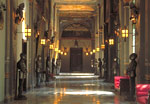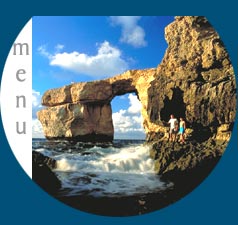|
||||||||||||||||||||||||
| Introduction | ||||||||||||||||||||||||
Malta,
independent republic in The
area of the largest island, Malta, is 246 sq km (95 sq mi); of Gozo,
67 sq km (26 sq mi); and of Kemmuna, 3 sq km (1 sq mi). The combined
area of Kemmunett and Filfla is 0.3 sq km (0.12 sq mi). The total
area is 316 sq km (122 sq mi). The capital and leading port of the
country is Valletta, a world heritage site (population, 1997 estimate,
7,172). The population of Malta (2000 estimate) is 383,285. The
overall population density is 1,212 persons per sq km (3,138 per
sq mi). |
||||||||||||||||||||||||
| Land | ||||||||||||||||||||||||
The
islands  of Malta consist of low-lying coralline limestone plateaus surrounded
by impermeable clay slopes. The highest point is 239 m (784 ft)
above sea level. The climate is dry and temperate, with a mean temperature
of 19° C (66° F). Average annual rainfall is about 560 mm (about
22 in). Because Malta has no permanent rivers or lakes and precipitation
is limited, the natural water supply has become a problem. The country
has implemented a program to desalinate sea water; up to 70 percent
of Malta's water comes from desalination plants.
of Malta consist of low-lying coralline limestone plateaus surrounded
by impermeable clay slopes. The highest point is 239 m (784 ft)
above sea level. The climate is dry and temperate, with a mean temperature
of 19° C (66° F). Average annual rainfall is about 560 mm (about
22 in). Because Malta has no permanent rivers or lakes and precipitation
is limited, the natural water supply has become a problem. The country
has implemented a program to desalinate sea water; up to 70 percent
of Malta's water comes from desalination plants.Click here for a map of Malta |
||||||||||||||||||||||||
| Population | ||||||||||||||||||||||||
The
Maltese are predominantly Roman Catholic and speak  a language similar in vocabulary to Arabic, although its alphabet
and grammatical structure are derived from Latin. Both Maltese and
English are official languages. Italian is widely spoken. Education
is free and compulsory for children between the ages of 5 and 16.
The University of Malta (1592) in Msida had approximately 5,000
students in 1994.
a language similar in vocabulary to Arabic, although its alphabet
and grammatical structure are derived from Latin. Both Maltese and
English are official languages. Italian is widely spoken. Education
is free and compulsory for children between the ages of 5 and 16.
The University of Malta (1592) in Msida had approximately 5,000
students in 1994. |
||||||||||||||||||||||||
| Economy | ||||||||||||||||||||||||
Manufacturing
for export, ship construction and repair, and tourism are Malta's
chief industries. Major manufactures include processed food and
beverages, textiles and clothing, furniture and wood products, printing
and publishing, tobacco products, transportation equipment (especially
ships), mac The Maltese Lira is the unit of currency. It is equivalent to 2.4 €uros, 1.5 UK sterling and 2.5 US dollars. All major credit cards and traveler's cheques are accepted. |
||||||||||||||||||||||||
| Government | ||||||||||||||||||||||||
According to the terms
of the constitution of 1964, substantially amended in 1974, Malta
is a democratic republic. The head of state is the president, who is appointed by parliament to serve a
term of five years. Legislative authority is vested in the House of
Representatives, composed of at a minimum of 65 members elected to
five-year terms by universal adult suffrage on the basis of proportional
representation. A variable number of extra seats are awarded to the
party with the majority of the popular vote in order to ensure a majority
in the legislature. The head of government is a prime minister appointed
by the president from among the members of parliament and responsible
to the legislature. The prime minister is assisted by a cabinet.
state is the president, who is appointed by parliament to serve a
term of five years. Legislative authority is vested in the House of
Representatives, composed of at a minimum of 65 members elected to
five-year terms by universal adult suffrage on the basis of proportional
representation. A variable number of extra seats are awarded to the
party with the majority of the popular vote in order to ensure a majority
in the legislature. The head of government is a prime minister appointed
by the president from among the members of parliament and responsible
to the legislature. The prime minister is assisted by a cabinet.
|
||||||||||||||||||||||||
| History | ||||||||||||||||||||||||
The many ancient
monuments and remains on Malta attest to the great age of its civilization.
Remains from Stone Age and Bronze Age peoples have been found in
subterranean burial chambers near Rahal Gdid. The islands became
a Phoenician colony about 1000 BC. In 736 BC they were occupied
by  the
Greeks, who called the colony Melita, and later the islands passed
successively into the possession of Carthage and Rome. At the division
of the Roman Empire in scaps AD395, Malta was awarded to the Eastern
Roman Empire. The islands were occupied by Arabs in 870. A Norman
army conquered the Maltese Arabs in 1090, and Malta was later made
a feudal fief of the kingdom of Sicily. In 1530 Holy Roman Emperor
Charles V granted Malta to the Knights of Saint John of Jerusalem,
who ruled the islands until the 19th century. After a famous and
unsuccessful siege by the Ottoman Turks in 1565, the Knights fortified
Valletta so strongly that it became one of the greatest Mediterranean
strongholds. the
Greeks, who called the colony Melita, and later the islands passed
successively into the possession of Carthage and Rome. At the division
of the Roman Empire in scaps AD395, Malta was awarded to the Eastern
Roman Empire. The islands were occupied by Arabs in 870. A Norman
army conquered the Maltese Arabs in 1090, and Malta was later made
a feudal fief of the kingdom of Sicily. In 1530 Holy Roman Emperor
Charles V granted Malta to the Knights of Saint John of Jerusalem,
who ruled the islands until the 19th century. After a famous and
unsuccessful siege by the Ottoman Turks in 1565, the Knights fortified
Valletta so strongly that it became one of the greatest Mediterranean
strongholds. |
||||||||||||||||||||||||
| |
||||||||||||||||||||||||
| British Rule Established | ||||||||||||||||||||||||
In
1798 Napoleon invaded and occupied the islands during his Egyptian
campaign. Unwilling to be ruled by France, the Maltese appealed
to Britain, and in 1799 the British naval officer Horatio Nelson
besieged Valletta and compelled the withdrawal of the French. By
the terms of the Treaty of Paris, in 1814, Malta became part of
the British Empire as a crown colony. The Maltese increasingly demanded
self-government during the 19th century. In 1921, as a reward for
its help during World War I, the colony was given a constitution
that provided for a legislature elected by the inhabitants. The
strategic position of the islands made Malta the object of many
Italian intrigues. In 1936, because of increasing Italian influence,
the constitution was revoked. During World War II (1939-1945) Allied
fighter planes and submarines were based on Malta. Consequently,
Malta withstood heavy bombing by the German and Italian air forces;
in 1942 George VI, king of the United Kingdom of Great Britain and
Northern Ireland, awarded the colony as a whole the George Cross
for heroism. |
||||||||||||||||||||||||
| Independence Gained | ||||||||||||||||||||||||
A
constitution effective on November 1, 1961, gave Malta internal
self-government. In the campaign preceding the first election under
the new constitution, the Labour Party called for independence outside
the Commonwealth; the Nationalists, the other major party, which
advocated independence within the Commonwealth, won the election,
and their leader, George Borg Olivier, became prime minister. Malta
became independent on September 21, 1964, and a United Nations member
on December 1. |
||||||||||||||||||||||||
| Mintoff's Government | ||||||||||||||||||||||||
In
elections in June 1971, Olivier's Nationalist Party was defeated
by the Labour Party, and Dominic Mintoff became prime minister of
a Labour cabinet. He changed the form of the island's government
to that of a republic in 1974. In the subsequent years the country's politics became violently polarized, and Mintoff was accused of strong-arm tactics. Claiming nonalignment in international affairs, the country declined in 1979 to renew the agreement under which British troops of the North Atlantic Treaty Organization (NATO) had rented facilities on the island. Malta and Libya cooperated closely in the late 1970s, but relations were strained in 1980 by a dispute over oil-drilling rights in Mediterranean waters. In December 1981 Mintoff's government won a mandate for a third five-year term in office; in December 1984, however, Mintoff resigned and was succeeded as prime minister by his education minister, Carmelo Mifsud Bonnici. After 16 years out of power, the Nationalist Party won the national election of May 1987, and its leader, Eddie Fenech Adami, became prime minister. |
||||||||||||||||||||||||
| Recent Events | ||||||||||||||||||||||||
The
Nationalists retained their majority in the February 1992 election,
and in 1994 Ugo Mifsud Bonnici became president. In 1990 Malta and
Libya renewed their bilateral cooperation treaty until 1995. Ties
between the two countries were strengthened by the abolition of
visa requirements and the establishment of Voice of the Mediterranean,
a jointly administered radio station. Malta submitted an application
for full membership in the European Union (EU) in 1990, and negotiations
were high priority until 1996, when the newly-elected government
under prime minister Alfred Sant put Malta's application on hold.
Eddie Fenech Adami again became prime minister in September 1998,
and Malta reopened its bid for EU membership. In April 1999 Professor
Guido de Marco was sworn in as president. |
||||||||||||||||||||||||
"Malta,"
Microsoft® Encarta® Online Encyclopedia 2000 http://encarta.msn.com © 1997-2000 Microsoft Corporation. All rights reserved. © 1993-2000 Microsoft Corporation. All rights reserved. |



 the Commonwealth of Nations, consisting of a small group of islands—Malta,
Gozo, Kemmuna, Kemmunett, and Filfla—located in the Mediterranean
Sea south of Sicily.
the Commonwealth of Nations, consisting of a small group of islands—Malta,
Gozo, Kemmuna, Kemmunett, and Filfla—located in the Mediterranean
Sea south of Sicily.
 hinery,
rubber and plastic goods, and chemicals. Tourism is increasingly
important; the country had 1.2 million visitors in 1998. Shipping-related
industries are vital to Malta's economy. These industries include
shipbuilding facilities, naval construction and repair facilities,
and transshipment centers.
hinery,
rubber and plastic goods, and chemicals. Tourism is increasingly
important; the country had 1.2 million visitors in 1998. Shipping-related
industries are vital to Malta's economy. These industries include
shipbuilding facilities, naval construction and repair facilities,
and transshipment centers.